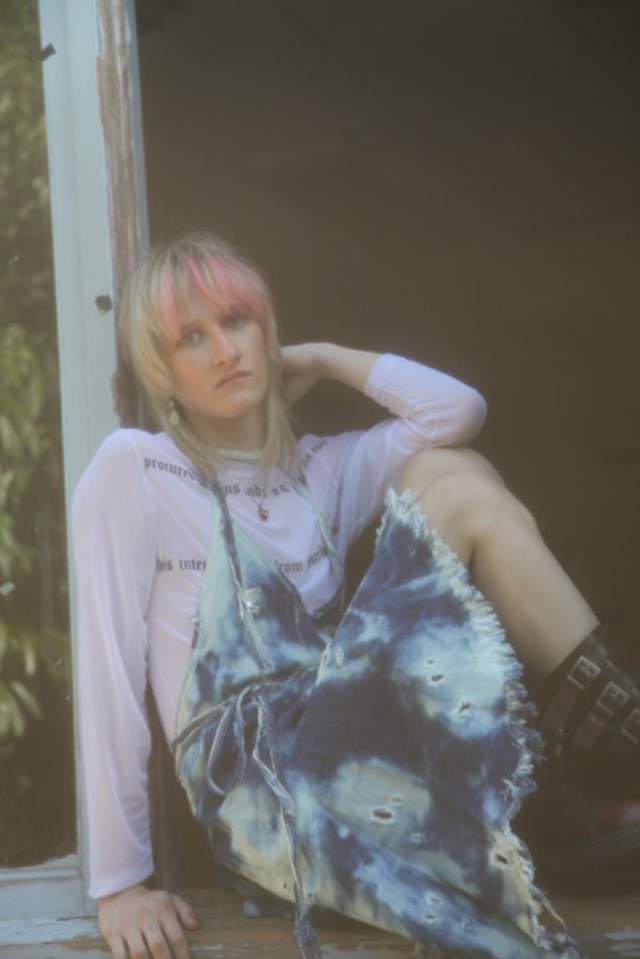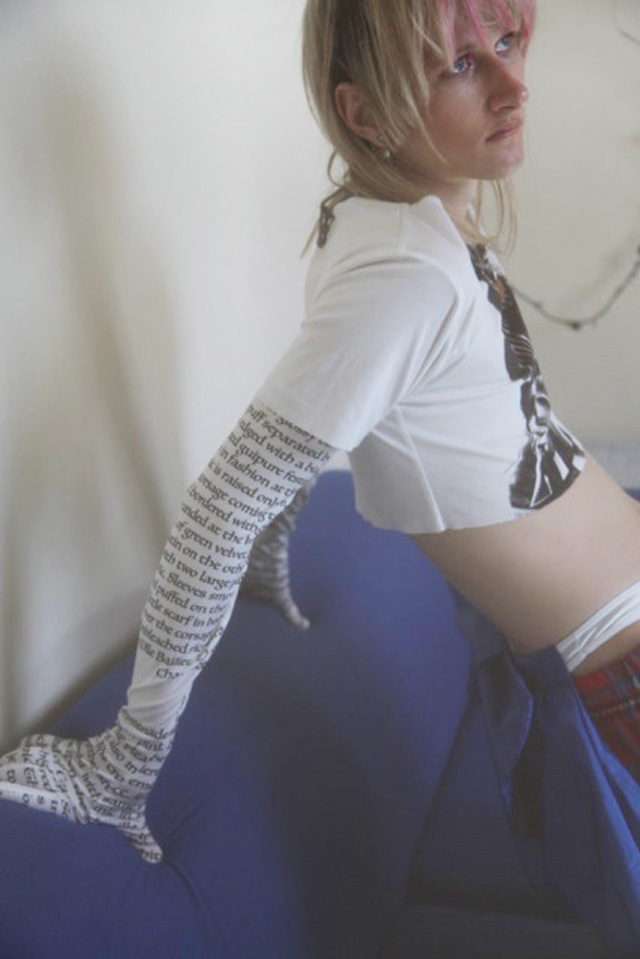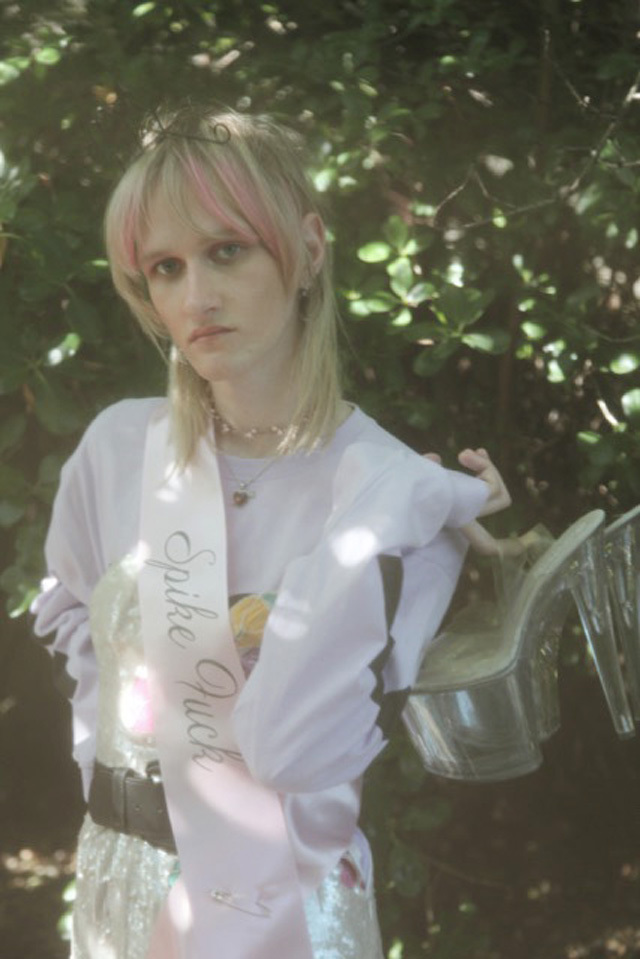Most of what we came eye-to-eye with in 2016 can be locked away in a treasure chest and thrown in the goddamn ocean. But hey, at least there was great art, great music, and great people who changed the way we think and feel this year. One person who stands out among many is Spike Fuck, the Melbourne-based musician who wrote one incredible four-track EP and created a cult-like fan base. She started a beautifully honest conversation about addiction, loneliness, and gender identity through her autobiographical new-wave, post-punk, pop compositions. With her second EP in the works, Spike sat down with i-D Australia to talk about the year in review, what’s next, and country music’s hardcore soul.
Tell us about the new music.
There’s a new EP coming; the lead single is almost ready. But I’ve been working this whole time, basically, to make a country album — one that’s cool and received well. I think I’m poised for that now because I’ve presented myself and contextualized it all. Now I feel like I can hit ’em with the country record, because I don’t think I could’ve come straight out with it. I think it’s about time. It’s been too long between drinks, between EPs.
Smackwave was written from the perspective of a character — a washed up early 80s rockstar down on their luck. Tell us about the character you’re writing as in this new stuff.
Well, this next EP is the prequel to Smackwave, which is set in the late 60s, early 70s. I guess it’s set at the height of the character’s fame. It takes place just after the dissolution of the band Bad Blood — which people still write about thinking it’s a real band.

Wait, Bad Blood isn’t a real band?
It’s based on real life. I was in a psychedelic rock band in high school which went awry. I was really tyrannical about the band. One time someone was late and I threw my phone at the wall. We played the Cowes Caravan Park battle of the bands. And lost — or didn’t win. We played a show at the Barley Corn, Melbourne’s worst-rated pub.
Sounds huge. What were your seminal albums as a teenager?
Misfits’ Famous Monsters, which was Misfits without Danzig. It was pretty “rock horror,” very cheesy punk, but I loved it. Nevermind the Bollocks, It’s Alive by The Ramones, Alanis Morissette’s Jagged Little Pill, Belle and Sebastian. But mainly punk stuff; I grew into country a bit later. I really gravitated towards artists on the brink — people who wrote country albums before they died or before they lost their minds. This one guy Skip Spence attacked his bandmate with a fire axe in the 60s. He went a bit nuts and he wrote this album in the Bellvue Hospital in New York. It’s called Oar. It’s pretty unnerving, actually. And then there’s Roky Erickson who did a similar thing. He was schizophrenic. All these tragic figures, I’m drawn to them. When people think of country they think of these naf, corny albums but I tend to think of these hardcore punk rockers, before punk was even invented. I think it’s time for a comeback.
There’s something very alluring about tragedy and disgrace in music, maybe because everything is turned into art. You can hold somebody’s mental breakdown in your hands.
Yeah, mental illness and drug abuse and mis-shot fame is really interesting. On the edge of success and you blew it all. That’s something I really want to explore — getting exposure and then fucking it up. Brian Jonestown is a more recent example; a band that blew millions of dollars of record deals by getting drunk and having fights on stage. But that’s who you remember in 100 years time.
Do you see the story getting bigger than it is now? What happens to Spike Fuck?
To be honest, I didn’t even think I’d make the prequel. But I’m doing it now and it’s coming together, so who knows. I don’t want to limit myself to anything and even though this country thing might seem like a departure, or it might turn some people off, I’m not in it to write three albums that sound the same. I’m not even sure I just wanna stick to music. There’s so much more to this whole thing for me. It’s more than just the four tracks of an EP, it’s about the performance, it’s about the aesthetic and the concept. So I don’t know what’s going to happen with that but I think it will grow. Maybe I can be an impresario like 50 Cent or something. Get a nutrient water endorsement. Really have a finger in all the pies.

I’m behind you on that. Did a fan get your lyrics tattooed on their arm?
Yeah, oh my god! She’s amazing. She posts something Spike Fuck-related every other day. I met her in Paris and she’s super nice. But she’s very intense.
It must be hard to swallow sometimes.
It is. Mostly I just hope she doesn’t resent me in ten years when she looks down at it and doesn’t like me anymore.
You have a habit of attracting some pretty full-on fans.
Yeah, I know. I worry that talking about it maybe makes me seem conceited, but some people really identify with what I do and really get into it. I don’t really understand it personally, I don’t know exactly what it is but it goes beyond liking the music.
I think it’s a meeting of your accessibility and then the disarming element, which makes it fun and dangerous.
The cross section of people that “get it” throws me constantly. Like, getting messages from people from my high school, people I didn’t know or people that weren’t very nice to me back then. Saying congratulations or that they like what I do. Jocks and music people and art people all seem to relate. There were two babies at my M Pavilion gig. My mom wears a Spike Fuck t-shirt.
Is any of this ever unsettling?
Something I’ve found disarming has been coming out and living in public; it’s very much like, becoming extremely vulnerable as a spokesperson for a scene. It’s hard. People say “I get it, I know Spike. I get the whole gender thing, the whole trans thing,” which sometimes makes it feel tokenistic, even though it’s well-intentioned.
When Dazed interviewed me, they asked me: “do you think that the trans thing and the heroin thing will become clickbait?” I didn’t even think about that. It’s a story as old as time, the drugs thing, the gender-bending rock star. But I think I’m so explicit in the way I do it that it’s clear that I don’t necessarily want to be the things that I am. I just am. If it helps anyone in any way that’s really nice, because I hid what I was and what I felt and what I did for so long, and now I’m living the complete opposite life. I guess I’m “living my truth.” But, you know, I’m off heroin and I’m out, but I’m still very much figuring things out.
Shedding that facade is so good for you. It makes every aspect of your life better and easier because you don’t need to spend every waking minute thinking about the version of yourself that you’re constructing.
Yeah, and I talk about those things in my new songs. About things I probably wouldn’t even say to my partner, I write that out in my songs. It’s personal to the point of embarrassing, or humiliating, which is why people probably identify with it so much.
Credits
Text Isobel Beech
Photography Kirsty Barros
Assistant Rowan Wagner
Hair and makeup Shella Martin Ruby
